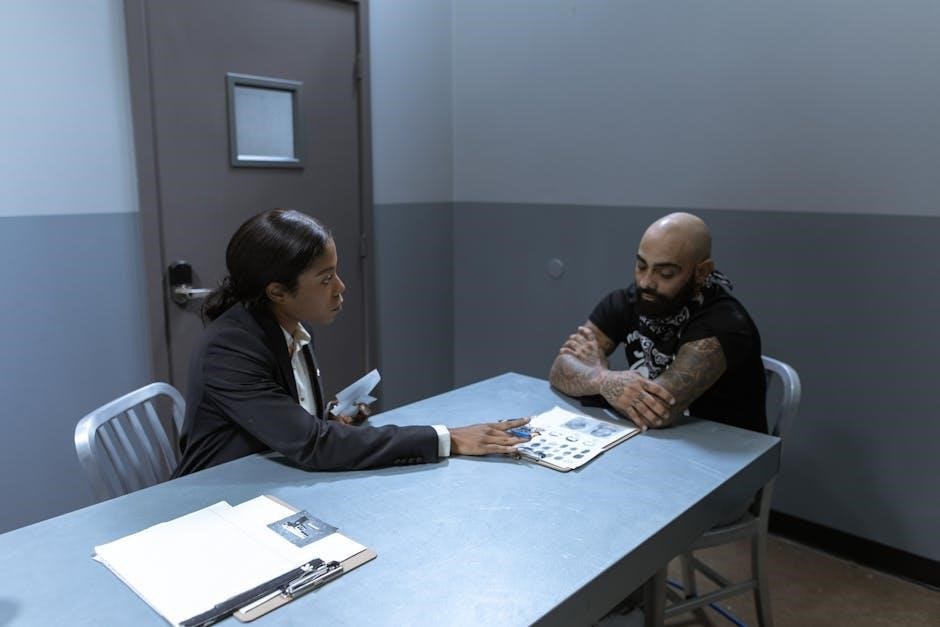The IBEW Apprenticeship Program offers a structured path to mastering electrical trade skills through hands-on training, classroom instruction, and mentorship, emphasizing safety and comprehensive education.
Overview of the IBEW Apprenticeship Program
The IBEW Apprenticeship Program provides a structured path to mastering electrical trade skills, combining hands-on training with classroom instruction. Apprentices gain practical experience under mentorship, learning safety protocols, electrical codes, and advanced techniques. The program emphasizes comprehensive education, preparing individuals to meet union standards and excel in their careers as licensed electricians.
Importance of Preparation for the Interview
Preparation is essential for excelling in an IBEW interview, as it demonstrates commitment and professionalism. Researching the program, understanding the role, and practicing responses to common IBEW interview questions will boost confidence and readiness. A well-prepared candidate makes a stronger impression and is more likely to succeed in securing a spot in the apprenticeship program.

Common IBEW Interview Questions
IBEW interviews often cover motivation, experience, and problem-solving skills. Questions include reasons for joining, electrical field experience, and handling challenging situations, preparing candidates thoroughly.
Why Do You Want to Join the IBEW?
This question assesses your motivation and understanding of the union’s values. Emphasize career growth, commitment to the electrical trade, and desire to contribute to a strong, supportive brotherhood. Highlight how the IBEW’s apprenticeship program aligns with your goals, offering structured training and mentorship to excel in the field.
What Experience Do You Have in the Electrical Field?
Highlight specific experiences, such as working with electrical systems, tools, or projects. Mention any relevant training or certifications. Emphasize hands-on skills, problem-solving abilities, and familiarity with safety protocols. Connect your experience to the IBEW’s standards and apprenticeship goals, showing how your background prepares you for the program and contributes to the electrical trade.
Can You Describe Your Specialization So Far?
Discuss your area of focus within the electrical field, such as residential, commercial, or industrial work. Highlight specific skills like wiring, circuitry, or troubleshooting. Mention any specialized tools or technologies you’ve mastered. Emphasize how your expertise aligns with the IBEW apprenticeship goals and how it contributes to the trade. Be clear and concise, showcasing your technical knowledge and hands-on abilities.

Behavioral and Experience-Based Questions
These questions assess your problem-solving skills, teamwork abilities, and adaptability in real-world scenarios. Be prepared to provide specific examples from your past experiences, demonstrating your approach to challenges and collaboration.
Tell Me About a Time You Solved a Problem on the Job
When faced with a challenge, identify the issue, assess possible solutions, and implement the most effective one. Describe a specific scenario where you applied critical thinking to resolve a problem, ensuring safety and efficiency. Highlight your role, actions taken, and the positive outcome, demonstrating your ability to work independently and as part of a team to achieve successful results.
Describe a Situation Where You Worked as Part of a Team
Provide an example of collaborating with others to achieve a common goal, such as working on an electrical installation or troubleshooting a complex issue. Highlight your role, how you communicated effectively, and how teamwork led to a successful outcome. Emphasize active listening, adaptability, and contributing to a positive group dynamic to ensure the task was completed efficiently and safely.

Preparing for Your IBEW Interview
Thorough preparation is key to success. Research the IBEW apprenticeship program, practice answering common questions, and review your experience to confidently showcase your skills and enthusiasm.
Researching the IBEW and the Apprenticeship Program
Researching the IBEW and its apprenticeship program is crucial. Understanding the program’s structure, benefits, and expectations helps you align your goals with their mission. Familiarize yourself with the union’s values, training methods, and career opportunities. This knowledge demonstrates genuine interest and prepares you to address specific questions confidently during your interview, showing your commitment to the program and the trade.
Practicing Your Responses to Common Questions
Practicing your responses to common IBEW interview questions is essential for confidence. Engage in mock interviews with friends or mentors to simulate real scenarios. Understand the interviewers’ goals: assessing your experience, problem-solving skills, and fit for the program. Reviewing sample questions and preparing thoughtful answers ensures clarity and precision. Regular practice helps reduce anxiety and enhances your ability to articulate your qualifications effectively.

Assessment Criteria for Applicants
Applicants are evaluated based on relevant skills, work experience, problem-solving abilities, teamwork, and communication; Demonstrated commitment to learning and adaptability are also key factors in selection.
Evaluation of Relevant Skills and Experience
Applicants are assessed on their hands-on experience, technical knowledge, and problem-solving abilities. Interviewers ask about specific work scenarios to gauge expertise and adaptability. Emphasis is placed on practical skills, safety awareness, and the ability to apply knowledge in real-world situations; Demonstrated proficiency in electrical systems, tools, and teamwork further supports a strong candidacy for the apprenticeship program.
Review of Your Interview Performance
Your interview performance is thoroughly evaluated based on clarity, confidence, and relevance of responses. Assessors focus on problem-solving skills, communication abilities, and alignment with IBEW values. Feedback highlights strengths and areas for improvement, ensuring a fair and transparent selection process for the apprenticeship program.

Tips and Best Practices for Success
Dress professionally, arrive early, and maintain confidence. Be honest about your experience and skills. Practice answering common questions and stay positive throughout the process.
Dressing Professionally and Being Punctual
Dress in business attire, ensuring cleanliness and professionalism. Avoid casual clothing or overly flashy accessories. Plan to arrive 10-15 minutes early to demonstrate responsibility and respect. Consider traffic or delays when scheduling your route. A polished appearance and punctuality create a strong first impression, reflecting your commitment to the opportunity and the IBEW program.
Being Honest and Confident During the Interview
Be truthful about your skills and experiences, showcasing your genuine passion for the trade. Confidence is key, but avoid arrogance. Maintain eye contact, speak clearly, and highlight your strengths. Authenticity builds trust and demonstrates your readiness to grow within the IBEW apprenticeship program.
Preparing for your IBEW interview requires dedication and honesty. Stay positive, showcase your skills, and confidently share your experiences. Pursue this apprenticeship with determination and passion.
Summarizing Key Points for a Successful Interview
Research the IBEW program, practice answering common questions, and showcase your skills. Be honest, confident, and professional. Highlight your motivation, experience, and problem-solving abilities. Dress appropriately and arrive early. Stay positive and follow up after the interview. Preparation and sincerity are key to making a strong impression.
Encouragement to Pursue the Apprenticeship
Pursuing the IBEW apprenticeship is a rewarding path to a successful electrical career. It offers hands-on learning, mentorship, and union support, fostering professional growth and financial stability. Embrace this opportunity to develop in-demand skills and contribute to meaningful projects. Stay committed, and you’ll build a fulfilling career with endless possibilities for advancement and personal satisfaction.

Additional Resources for Further Preparation
Utilize recommended PDF guides, video tutorials, and online forums to enhance your preparation. These resources provide insights into common questions, expert tips, and real applicant experiences, ensuring you’re well-equipped for success.
Recommended PDF Guides and Study Materials
Enhance your preparation with top-rated PDF guides and study materials. These resources include comprehensive lists of common questions, sample answers, and expert tips tailored for IBEW interviews. Videos and tutorial guides also offer practical insights, helping you understand the format and expectations. Download these materials to review real-life scenarios and improve your confidence for the interview process.
Online Forums and Communities for Support
Engage with online forums and communities dedicated to IBEW apprenticeships. These platforms offer valuable insights, tips, and real-life experiences from current and former applicants. Many forums share interview questions, study materials, and advice from union members. Participating in these communities can provide reassurance, practical guidance, and a sense of camaraderie as you prepare for your interview and apprenticeship journey.

Final Checklist Before the Interview
Review notes, practice responses, and ensure all materials are ready. Double-check the interview location and arrive early. Stay calm and confident.
Reviewing Notes and Practicing Responses
Thoroughly review your notes and practice answering potential questions. Focus on clarity, confidence, and relevance to the IBEW apprenticeship program. Rehearse responses to common questions like why you want to join the IBEW and your electrical experience. Use flashcards or record yourself to refine your delivery. Ensure your answers align with the program’s values and requirements, demonstrating your commitment and readiness.
Ensuring All Materials Are Ready
Gather and organize all necessary documents, such as your resume, references, and certifications. Ensure you have multiple copies of each and store them in a professional folder. Double-check that all materials are updated and relevant to the IBEW apprenticeship. Bring a notebook and pen for note-taking, and review any additional documents requested by the interview committee. Be prepared to present a polished, professional image.

Next Steps After the Interview
After the interview, send a thank-you note to the committee, reiterating your interest in the apprenticeship. Wait patiently for feedback and follow up if necessary. Stay persistent and positive, as the selection process may take time. Continue refining your skills and preparing for potential next steps in the program.
Following Up with the Interview Committee
After your interview, send a thank-you note to the committee within 24 hours, expressing gratitude for the opportunity and reaffirming your interest in the apprenticeship. If you haven’t heard back within 7-10 business days, consider following up with a polite email or phone call to inquire about the status of your application. This demonstrates professionalism and enthusiasm for the program.
Staying Positive and Persistent
Remaining positive and persistent after your interview is crucial. Avoid anxiety by staying focused on your goals and understanding that the selection process takes time. If not selected initially, use feedback to improve and reapply. Persistence demonstrates resilience and commitment, key qualities for success in the IBEW apprenticeship program and beyond.



